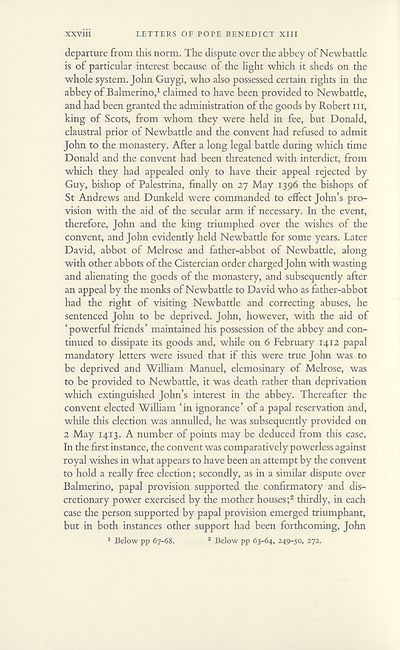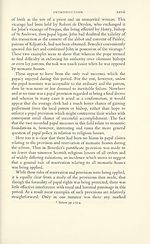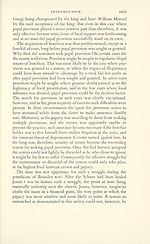Series 4 > Calendar of Papal letters to Scotland of Benedict XIII of Avignon, 1394-1419
(33) Page xxviii
Download files
Complete book:
Individual page:
Thumbnail gallery: Grid view | List view

XXviii LETTERS OF POPE BENEDICT XIII
departure from this norm. The dispute over the abbey of Newbattle
is of particular interest because of the light which it sheds on the
whole system. John Guygi, who also possessed certain rights in the
abbey of Balmerino,1 claimed to have been provided to Newbattle,
and had been granted the administration of the goods by Robert in,
king of Scots, from whom they were held in fee, but Donald,
claustral prior of Newbattle and the convent had refused to admit
John to the monastery. After a long legal battle during which time
Donald and the convent had been threatened with interdict, from
which they had appealed only to have their appeal rejected by
Guy, bishop of Palestrina, finally on 27 May 1396 the bishops of
St Andrews and Dunkeld were commanded to effect John’s pro¬
vision with the aid of the secular arm if necessary. In the event,
therefore, John and the king triumphed over the wishes of the
convent, and John evidently held Newbattle for some years. Later
David, abbot of Melrose and father-abbot of Newbattle, along
with other abbots of the Cistercian order charged John with wasting
and alienating the goods of the monastery, and subsequently after
an appeal by the monks of Newbattle to David who as father-abbot
had the right of visiting Newbattle and correcting abuses, he
sentenced John to be deprived. John, however, with the aid of
‘ powerful friends ’ maintained his possession of the abbey and con¬
tinued to dissipate its goods and, while on 6 February 1412 papal
mandatory letters were issued that if this were true John was to
be deprived and William Manuel, elemosinary of Melrose, was
to be provided to Newbattle, it was death rather than deprivation
which extinguished John’s interest in the abbey. Thereafter the
convent elected William ‘in ignorance’ of a papal reservation and,
while this election was annulled, he was subsequently provided on
2 May 1413. A number of points may be deduced from this case.
In the first instance, the convent was comparatively powerless against
royal wishes in what appears to have been an attempt by the convent
to hold a really free election; secondly, as in a similar dispute over
Balmerino, papal provision supported the confirmatory and dis¬
cretionary power exercised by the mother houses;2 thirdly, in each
case the person supported by papal provision emerged triumphant,
but in both instances other support had been forthcoming, John
1 Below pp 67-68. 2 Below pp 63-64, 249-50, 272.
departure from this norm. The dispute over the abbey of Newbattle
is of particular interest because of the light which it sheds on the
whole system. John Guygi, who also possessed certain rights in the
abbey of Balmerino,1 claimed to have been provided to Newbattle,
and had been granted the administration of the goods by Robert in,
king of Scots, from whom they were held in fee, but Donald,
claustral prior of Newbattle and the convent had refused to admit
John to the monastery. After a long legal battle during which time
Donald and the convent had been threatened with interdict, from
which they had appealed only to have their appeal rejected by
Guy, bishop of Palestrina, finally on 27 May 1396 the bishops of
St Andrews and Dunkeld were commanded to effect John’s pro¬
vision with the aid of the secular arm if necessary. In the event,
therefore, John and the king triumphed over the wishes of the
convent, and John evidently held Newbattle for some years. Later
David, abbot of Melrose and father-abbot of Newbattle, along
with other abbots of the Cistercian order charged John with wasting
and alienating the goods of the monastery, and subsequently after
an appeal by the monks of Newbattle to David who as father-abbot
had the right of visiting Newbattle and correcting abuses, he
sentenced John to be deprived. John, however, with the aid of
‘ powerful friends ’ maintained his possession of the abbey and con¬
tinued to dissipate its goods and, while on 6 February 1412 papal
mandatory letters were issued that if this were true John was to
be deprived and William Manuel, elemosinary of Melrose, was
to be provided to Newbattle, it was death rather than deprivation
which extinguished John’s interest in the abbey. Thereafter the
convent elected William ‘in ignorance’ of a papal reservation and,
while this election was annulled, he was subsequently provided on
2 May 1413. A number of points may be deduced from this case.
In the first instance, the convent was comparatively powerless against
royal wishes in what appears to have been an attempt by the convent
to hold a really free election; secondly, as in a similar dispute over
Balmerino, papal provision supported the confirmatory and dis¬
cretionary power exercised by the mother houses;2 thirdly, in each
case the person supported by papal provision emerged triumphant,
but in both instances other support had been forthcoming, John
1 Below pp 67-68. 2 Below pp 63-64, 249-50, 272.
Set display mode to:
![]() Universal Viewer |
Universal Viewer | ![]() Mirador |
Large image | Transcription
Mirador |
Large image | Transcription
Images and transcriptions on this page, including medium image downloads, may be used under the Creative Commons Attribution 4.0 International Licence unless otherwise stated. ![]()
| Scottish History Society volumes > Series 4 > Calendar of Papal letters to Scotland of Benedict XIII of Avignon, 1394-1419 > (33) Page xxviii |
|---|
| Permanent URL | https://digital.nls.uk/126659067 |
|---|
| Description | Over 180 volumes, published by the Scottish History Society, containing original sources on Scotland's history and people. With a wide range of subjects, the books collectively cover all periods from the 12th to 20th centuries, and reflect changing trends in Scottish history. Sources are accompanied by scholarly interpretation, references and bibliographies. Volumes are usually published annually, and more digitised volumes will be added as they become available. |
|---|


